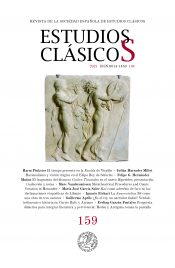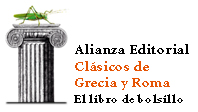EL TIEMPO PRESENTE EN LA ENEIDA DE VIRGILIOThe Present Tense in Virgil’s Aeneid
Harm Pinkster
Universidad de Ámsterdam
El profesor Harm Pinkster estudió Filología Clásica en la Universidad de Ámsterdam (1960-1967) y obtuvo en la misma universidad su doctorado con el trabajo titulado On Latin Adverbs. Catedrático de Lengua Latina, luego de Lengua y Literatura Latinas, en la misma universidad desde 1980, es en la actualidad Profesor emérito de Latín en ella. Es miembro de la Academia Europaea (1989), miembro correspondiente de la British Academy (2004), miembro extranjero de la Academia Finlandesa de Ciencias y Letras (2008), miembro de la Sociedad Holandesa de Ciencias (1988) y miembro honorario de la Asociación Neerlandesa de Estudios Clásicos (2009). Ha recibido el doctorado honoris causa en Ciencias Humanas por la Universidad de Chicago (2006) y por la Universidad Autónoma de Madrid (2017). Entre sus decenas de trabajos publicados debe destacarse la monumental Oxford Latin Syntax (2015-2021), que se ha constituido desde su aparición en el libro de referencia para todo el campo.
Resumen
El presente artículo propone diferentes interpretaciones para el uso muy frecuente del tiempo presente en contextos de pasado en la Eneida. Frente a otros autores que lo consideran como un mero rasgo estilístico, sin relevancia semántica o pragmática, el autor concluye que la elección del tiempo presente es relevante para el conjunto de los usos de las formas verbales, puesto que condiciona la forma en que pueden utilizarse los demás tiempos; por otra parte, el presente conserva en muchos casos todavía rasgos propios de la narración oral; finalmente, se propone que se estudien los usos del presente dentro de una perspectiva general del sistema de tiempos latino.
Palabras clave: Tiempo presente; narración; Eneida
Abstract
The author offers different interpretations for the very frequent use of the present tense in past contexts in the Aeneid. Contrary to other authors who consider it as a mere stylistic feature, without semantic or pragmatic relevance, the author concludes that the choice of the present tense is contextually relevant, since it conditions the way in which the other tenses can be used; secondly, it is argued that the present tense still preserves in many cases features typical of oral narration; finally, the author claims for the study of the present tense within a general perspective of the Latin tense system.
Keywords: Present tense; narration: Aeneid
Referencias bibliográficas
Albrecht, M. v. (1970) «Zu Vergil’s Erzähltechnik: Beobachtungen zum Tempusgebrauch in der Aeneis», Glotta 48 , 219-229.
Albrecht, M. v. (1999) Roman Epic: An interpretative introduction, Leiden.
Fowler, D. (1990) «Deviant focalisation in Virgil’s Aeneid», PCPhS 36, 42-63.
Görler, W. (1985) «La lingua», Enciclopedia Virgiliana, Roma, I 262-78.
Hahn, E.A. (1930) Coordination of Non-coordinate Elements in Vergil, Nueva York, Tesis doctoral.
Heinze, R. (19153) Vergils epische Technik, Berlín-Leipzig.
Heinze, R. (1924) «Zum Gebrauch des praesens historicum im Altlatein», en Streitberg Festgabe, Leipzig 1924, 121-132.
Koller, H. (1951) «Praesens historicum und erzählendes Imperfekt», MH 8, 63-99.
Kravar, M. (1970) «Quousque über das historische Präsens», Ziva Antika 21, 155-158.
Kroon, C.H.M. & Rose, P. (1996) «Atrociter corruptus? The use of `narrative’ tenses in Ammianus Marcellinus’ Res Gestae», en Risselada et al. (eds.), 71-89.
Kroon, C.H.M. (1998) «Discourse particles, tense, and the structure of Latin narrative texts», en Risselada (ed.) 37-61.
Kühner, R. & Stegmann, C. (1914) Ausführliche Grammatik der latenischen Sprache, 2 vols., Hannover.
Leigh, M. (1997) Lucan: Spectacle and Engagement,Oxford.
Mellet, S. & Joffre, M.-D. & Serbat, G. (1994) Grammaire fondamentale du Latin: Le signifié du verbe, Lovaina la Nueva-París.
Militerni della Morte, P. (1996) Strutture e Stile del Bellum Africum, Nápoles.
Otis, B. (1964) Virgil. A Study in Civilized Poetry, Oxfor.
Pinkster, H. (1983) «Tempus, Aspect and Aktionsart in Latin (Recent trends 1961-1981)», ANRW 29.1 270-319.
Pinkster, H. (1990) Latin Syntax and Semantics, Londres [Trad. esp. Madrid, 1995].
Pinkster (1998a) «Is the latin present the unmarked, neutral tense in the system?», en Risselada (ed.), 63-83 .
Pinkster, H. (1998b) «The use of narrative tenses in Apuleius’ ‘Amor and Psyche’», en M. Zimmerman et al. (eds.) Aspects of Apuleius’ Golden Ass II: Cupid and Psyche, Groninga, 103-111.
Putnam, M.C.J. (1998) Virgil’s Epic Designs: Ecphrasis in the Aeneid, New Haven& Londres.
Quinn, K. (1968) Virgil’s Aeneid. A Critical Description, Londres.
Quirk, R. & Greenbaum, S. &Svartvik, G.J. (1985) A Comprehensive Grammar of the English Language (London 1985).
Risselada, R. (ed.) (1998): Latin in Use. Amsterdam Studies in the Pragmatics of Latin, Ámsterdam.
Risselada, R. & de Jong, J.R. & Bolkestein, A.M. (eds.) (1996) On Latin. Linguistic and Literary Studies in Honour of Harm Pinkster, Ámsterdam.
Sangmeister, U. (1978) Die Ankündigung direkter Rede im `nationalen’ Epos der Römer, Meisenheim a. G..
Sullivan, J.P. (1994) «Introduction: Critical continuity and contemporary innovation», en I.J.F. De Jong & J.P. Sullivan (eds.) Modern Critical Theory and Classical Literature, Leiden, 1-26.
Szantyr, A. (1965) Lateinische Syntax und Stilistik, Múnich.
Szantyr, A. (1975) «Bemerkungen zum Aufbau der Vergilischen Ekphrasis», MH 27, 28-40.
Touratier, C. (1994) Syntaxe Latine, Lovaina la Nueva-París.
Touratier, C. (1996) «Les temps dans un récit (Virgile, Ecloga 7.1-20)», en Risselada et al. (eds.), 163-172.
Tränkle H. (1960) Die Sprachkunst des Properz und die Tradition der lateinischen Dichtersprache, Wiesbaden.
Wackernagel, J. (1926) Vorlesungen über Syntax, 2 vols., Basilea.
Revista
-
Sobre la revista
Página principal
-
Estatutos
Estatutos de la Revista Estudios Clásicos
-
Código ético
Declaración de buenas prácticas
-
Normas de recepción y envío
Indicaciones para envíos de artículos
-
Equipo editorial
Consejos de redacción y asesor
-
Comité de honor
Comité de honor
Información
-
Para autores
Publicar con nosotros
-
Para evaluadores
Normas para evaluar artículos
-
Para bibliotecas
Información bibliográfica
-
Contacto
Cuestiones y preguntas
Publicar en EClás
-
Envío de originales
Artículos y reseñas
-
Normas de publicación
Descarga normas en PDF
-
Estilo CSL EClás
Estilo CSL EClás
-
Índices de calidad
Bases de datos e impactos


 c/ Serrano, 107
c/ Serrano, 107